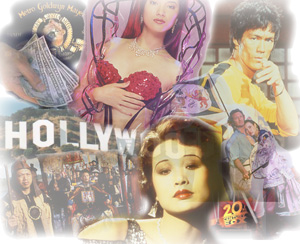|
ASIAN AMERICAN
If the mass media is the mirror of American society, Asian Americans could have claimed ghost status. We can help change it by wielding our consumer clout. by Tom Kagy |
CONTACT US
|
ADVERTISING INFO
© 1996-2013 Asian Media Group Inc
No part of the contents of this site may be reproduced without prior written permission.
MONEY, MEDIA &
The Asian American Image
PAGE 1 OF 4
 RUTH: There are too few positive Asian images in the media.
CONSEQUENCE: Our 5-year-old daughter tells me that I look like a bad
guy because she knows the good guys are caucasian. Who among us hasn't
been passed up for the chance to be the things we wanted to be because our
image didn't fit that role -- whether it's a job, a part, a date, an election?
RUTH: There are too few positive Asian images in the media.
CONSEQUENCE: Our 5-year-old daughter tells me that I look like a bad
guy because she knows the good guys are caucasian. Who among us hasn't
been passed up for the chance to be the things we wanted to be because our
image didn't fit that role -- whether it's a job, a part, a date, an election?

TRUTH: Most peoples' ideas of just who does or doesn't fit a role comes from what they see in the media. CONSEQUENCE: Asians are seen as standouts at being quiet sidekicks, making sushi, studying, tinkering with circuitboards, cleaning teeth and doing laundry. We are seen as constitutionally incapable of excelling at basketball, lawyering, sending audiences rolling in the aisles with uncontrolled laughter, seducing virtuous but incredibly sexy women, fighting with cool resourcefulness against astronomical odds -- well-oiled pecs and biceps glistening with sexy sweat -- to save the world from being blown up by cackling evil genuises. Hell, all too often, we are the cackling evil genuises.
You get the picture. We all do. And it pisses us off.
At the risk of sounding nerdy, technical and boring, let's first take a look at the mechanism underlying the problem. A few pages on we'll consider our prospects for seeing the situation improve and ways we can make a positive difference.
[CONTINUED BELOW]
Contrary to what politically-fixated types may believe, what the American
media chooses to offer to the public is not controlled by the federal,
state, county or city government. When it comes to information and
entertainment in the United States, there is no higher authority, no god
figure, to which supplicants can pray for relief -- and all sane Americans
would agree that that's the way it should be. The game of politics, when
played by tough, smart, dedicated politicians with ample political capital, can
reap important dividends in narrowly circumscribed situations -- for example,
in prompting Uncle Sam to pay reparations for violating the constitutional
rights of Japanese Americans during World War II -- but can, and should, have
no effect on the free media marketplace. The freedom of that marketplace is
expressly protected by the First Amendment and zealously guarded by the
press and most legal minds. Not even an American president dares invoke
his political powers against media privilege. Those who have
tried -- President Nixon comes to mind -- have paid dearly for the attempt.
Political channels are out as avenues for changing media portrayals, or
non-portrayals, of Asians.
An effectively-organized mass protest may help educate media honchos
about what kinds of things are likely to piss off Asians, but offers no real
benefit to the Asian community. To the contrary, it usually ends up helping
the culprit by providing tens of millions of dollars of valuable free
publicity -- not to mention a certain cache that translates into box office with
a sizeable segment of the population. I suspect Basic Instinct didn't
suffer from staged protests by San Francisco gay groups. I know -- I was one of those millions who went to see it out of sheer prurient curiosity generated entirely by media coverage of the protests.
Miss Saigon -- A Madame Butterfly knockoff for the 90s, from what I've heard -- undoubtedly took in added millions because of media attention generated by that misguided protest over casting a white actor to play a Eurasian pimp. I mean, who the hell cares who plays a role like that in a play like that! As an Asian American I was mortified that we would be seen as actually coveting roles in another one of those Hey-GI tales, to even be up in arms to get them. The protesters would have served our community far better by giving the thing exactly the reception it deserved--ho-hum indifference. Any other response only helps generate media heat, and in the entertainment business, media heat equals
box office.
Which brings us to the first of only two things that makes a difference to
those who run the American media--money. This is not a value judgement.
In a capitalist society money is the fuel that drives the engine of any
enterprise and the media is no exception. It provides essential sustenance.
If it stopped flowing into our accounts, for example, our own publishing
venture would stop dead in its tracks. Without ad revenues, your TV sets
wouldn't even show test patterns. Even your local PBS station, which so
warmly radiates its peculiar no-frills brand of education, culture and public
service programming, would grow dark without the steady stream of money
it cajoles and begs from sponsors and subscribers. Yes, even Big Bird and
Kermit have their fuzzy hands out for keeping your kids away from those
pesky toy commercials on those other stations. Just as you do what it takes
to ensure your family has food on the table, the Sesame Street gang--and
every other media family--does what it takes to keep the money flowing,
mostly from ad sales and subscription fees.
PAGE 2
| "All too often, we are the cackling evil genuises." |
